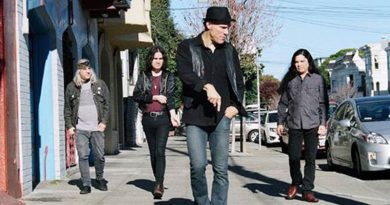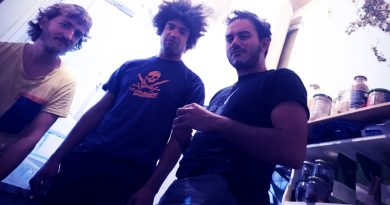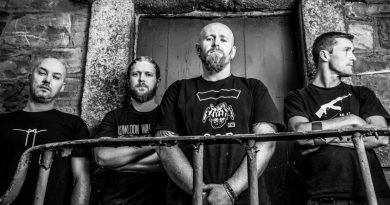In Search Of Tone: Aaron Turner Of SUMAC, Old Man Gloom, Mamiffer & ISIS
Aaron Turner is responsible for a FEW of my favorite bands. SUMAC, Old Man Gloom, ISIS and Mamiffer are amazing bands with each offering something different. He pushes his limits to the max with these projects and it’s something that can certainly be felt while listening. When those hairs on the back of your neck stand when listening, you know it’s something special.

Aaron shared some incredible insight into his creative world. He shares some valuable information and since our interview I‘ve been inspired to develop some ideas I had saved. It was a pleasure talking to Aaron and I hope you find this as helpful and interesting as I have.
I feel in most of your projects, you create some really unique tones. What amps are you using and do they differ from studio to live?
Occasionally I’ll deviate from when I’m in the studio for overdubs or something, I’ll use a different amp. But, most of the time for Old Man Gloom, Mamiffer, SUMAC and whatever else it is I’m doing, I use the same amp, which is a Fryette Pitbull. It’s a really versatile that’s as close as I have found to the perfect amplifier. I’m not very technically adept and it’s got a few more features than I feel comfortable with, but, I’ve learned my way around it enough to feel like I basically know how to handle it.
I’ve read that the SUMAC track May You Be Held and its opening riff reminds you of an AC/DC riff?
[Laughs] Yep.
I’m hearing, sometimes, that guitar players try and get the AC/DC type tones out of the amp before applying pedals. Is that something you do as well?
I actually only use the distortion from the amp. I use the high gain channel. I never really found distortion pedals to be effective for me. There was a period of time I used Sunn Model T’s, older ones, in ISIS from 2002 to 2007, so maybe about five years. I was using some distortion pedals because I really like the way the amp sounded, especially when we started doing some more clean stuff.
One of the things I always had a problem with pedals is that distortion pedals never gave a big enough signal boost when I would kick over. That always kind of bugged me when guitar players would go from a clean sound to a distorted sound and there was no jump in volume. It was always a weird shift.
I feel it’s a personal preference, but, when the distortion comes on I feel you should be louder [laughs]. I found using high gain channel on a multi channel amp, you set the clean channel lower and your gain channel louder and you get a much more significant boost in terms of level. That was one of the main reasons I started utilizing the gain channel on an amp, rather than a distortion pedal.
I also discovered tonally, I like the gain channel on an amp much better than any distortion pedal I ever used. This goes back to the very first tube head that I had which was a Mesa Mark IV, which I still have. The gain channel on that sounds awesome and I’ve never found a pedal that sounds anywhere near as good as those sounds.
Wow, that surprises me. I’m still learning about amps yet and would have never guessed your tones came mostly from you amp.
Yeah, a lot of people ask me about that and I’m actually surprised that so many people still use distortion pedals. Not that it’s a bad thing at all, and I certainly use certain fuzz pedals when I want to change the character of my distortion, but, overall pedal distortion has never worked for me with the sound I want.
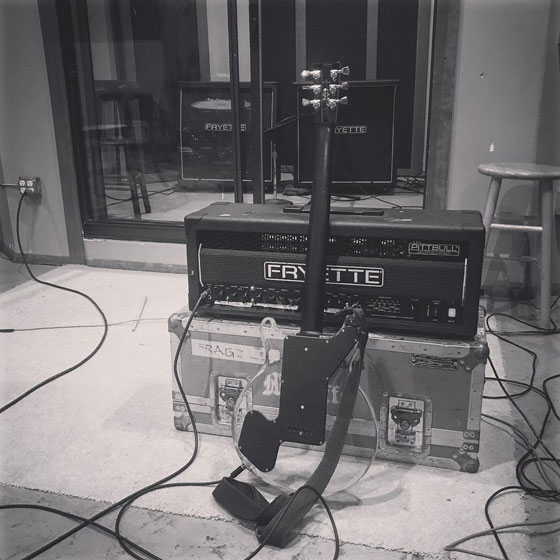
So, with the lack of distortion pedals, what pedals are you currently using?
I switch it up from time to time. But if I had to strip it down to two, for SUMAC I could get away with using just my Strymon Blue Sky and Death By Audio Evil Filter. The Blue Sky is definitely my current favorite reverb. I’ve been using it for a number of years now and I find that I tend to get tired of reverb sounds after a while because I get so used to one particular reverb color. So this may not be the one I always use, however, I have used it for quite some time and still not sick of it.
Then the Death By Audio Evil Filter is very useful for me. The filter range is really deep and the fuzz feature on there is pretty gnarly. I tend to like very destructive, very decayed fuzzes and distortions. The Evil Filter suits that need perfectly. It creates insane feedback, crazy overtones and basically makes my guitar sound like it’s melting, which is the goal for me at any given time to make my instrument sound like it’s about to collapse [laughs].
Last but not least, guitars. What guitars are you currently using?
For guitars, I’ve been using the Electrical Guitar Company guitars for a while now. I got my first one back in about 2008. As far as guitars for heavy music is concerned, I’ve not wanted to use anything else since. I met Kevin [Burkett] who runs EGC when he was building his early prototypes and he was kind enough to lend me one. Since borrowing that guitar and seeing how amazing it was, I started having him make me custom guitars. They’ve, pretty much been my only guitar since then as far as heavy stuff goes.
So for both SUMAC, Old Man Gloom and even the latter days of ISIS, I’m only using EGC guitars. I do also use an older Telecaster Deluxe on some of the Mamiffer songs and when I play in Mamiffer live. It’s the same Telecaster Deluxe that I used in ISIS from 2003 to 2008 and that’s probably my other favorite guitar. I do have a bunch other guitars, but if I had to narrow it down, I’d have to keep my Telecaster and my Electrical Guitar Company guitar. That would do it for me
Last year was a crazy year.
[Laughs] Yeah it was.
You’ve remained very productive with two Old Man Gloom albums, a new SUMAC LP and EP. What is your writing process like for each of these bands and does it change from project to project?
It does differ and I can’t say there’s any one method I can necessarily pinpoint. I will say I generally like to have a fairly focused idea completed on my own before I bring it to a band context, no matter what the project is. So I spend quite a bit of time working on making demos and sharing those ahead of time with my band mates, then when we get together finalizing the structures and everybody figuring out their individual parts.
I don’t typically do a lot of jamming to figure out songs, at least not anymore, part of that is because I don’t live near any of my band mates. So there’s not really that opportunity. There is something that has become more common at least in the world of SUMAC and that is straight up improv. Where we don’t have any preconceived plans of a song, or part of a song, and we just go in and see what happens.
So in that sense there is no songwriting involved for those parts of the songs, as we did with, for example, Keiji Haino. There’s no pre-plan at all and everything is just happening as it is in the moment. I like to have that flexibility to go from complete spontaneity to things I work out on my own where they’re a little bit more meticulous in their construction.
That’s interesting, creating songs from two complete different sides of the spectrum.
Yeah, Definitely
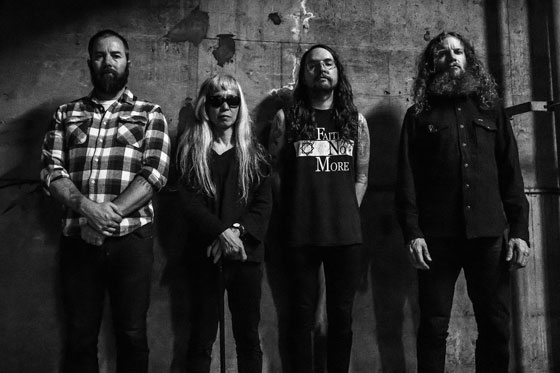
The new EP Two Beasts released for the Sub Pop singles series is an epic nineteen minutes. How did this song come about and did you set out to write a longer song from the beginning?
The impetus for the song was just based on the invitation from Sub Pop. They asked us to do a 7” for their single series. We agreed to do it. That single series has had some pretty monumental installments way back, especially for Brian [Cook, bass] and I and to a slightly lesser extent Nick [Yacyshyn, drums], being children of the 90s. A lot of that stuff is pretty historical and in our DNA. So it was awesome to be asked to do that
It was not our intention to write a nineteen minute song [laughs]. I was really trying to make an effort to write a song that was in the ten to twelve minute range. As far as SUMAC goes, these days, it’s on the medium to short side, but, as with many of our songs they just kind of take a life on their own and we have to follow them. That’s my philosophy on writing as well, I’ll start with maybe one part and build a song outwards from there that. That first part might be the middle of the song, the intro or it might be the end. It’s just an intuitive process of listening to whatever the initial idea is at that point of germination and finding out what needs to be built out around that.
Again, I don’t really sit out to write long songs. I just generally feel that for a song to be complete, I have to listen to it, play it, hear it on my own, play it within the group, and then the length of the song is dictated with how it feels after everything has been roughly sketched in. There are parts of the songs, like the end of Two Beasts, which is purely improv for the most part. We had an idea for the dynamic and some loose refrains that occurs in there, but, as far as the length of that whole section, we just had to play it in a few different takes. We kept the one that felt best and that ended up being a nineteen minute long song because it had to be [laughs].
It’s a great song.
Thank you, I’m glad you like it.
I’ve recently started recording some random riffs I’ve created when messing around. That’s as far as I get though. I have difficulty building on the riffs and linking them together. How do you go about creating your ideas and then building them into songs?
I often will just play the part. All the parts that I write just come from sitting down and playing. I find my way around the guitar, testing out different parts of the fretboard and trying different chord shapes and listening to what’s coming out until something emerges that I like. Then I’ll keep playing it and playing it, and it changes and it morphs some more. Once it gets to a point that there’s an idea taking shape, I’ll record it so I have a document of it, even if it’s very rough and completely sloppy. Just so I have some sort of point of reference that I can go back to.
Sometimes I’ll go back to those ideas. I’ll listen to them, I’ll play them some more and then I’ll just continue playing. I’ll throw a different chord into the progression, or try a different rhythmic pattern. Usually, it’s just a process. I’m hearing something and I hear it once or twice and it could be a total accident, it becomes a sign post of where the song should go next. It’s a matter of just sitting and playing while purposely moving my hand to a different place. Whether it’s to the left hand or the right. That often is just enough to be a good indicator of what could come after.
Othertimes I’ll listen to something I’ve written and I can hear something in my head, or I can picture what should come next, then I’ll try to play it the best I can from what I’m hearing in my head. Very often, it comes out differently from what I’ve imagined, but, often enough it has a semblance to what I’m hearing in my head and I can begin to stitch those ideas together. It happens every once in a while, that I’ll write a few different riffs and then I’ll listen to them and think about whether say riff B could go with riff E and just try budding them up to see how it sounds. If they sound complementary, but too jarring, I’ll try and think of what a good transitional piece would be. The methods vary, but, I think it’s all about having a dialogue with what I’m writing, listening to it as its happening and feeling it out. Seeing what it indicates, rather than trying to impose an idea of what it should be.
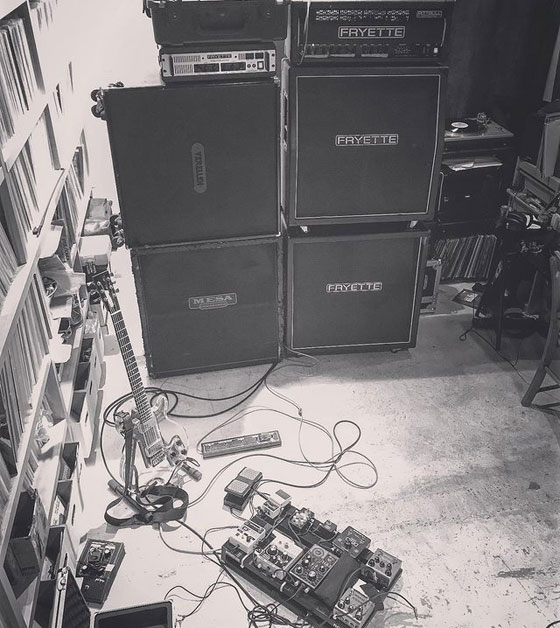
I remember reading how you almost scrapped SUMAC’s Rigid Man during the recording process. What makes you decide a song is good or bad, and what do you do on off days to get inspired to play again?
To touch on Rigid Man, I think I was pretty OK with that song, until I started trying to add vocals. Vocals for me, are often a real point of consternation. I get really trapped in my head and super self-conscious about it. It can really ruin an experience of a song for me trying to fit vocals to something. So it’s really the process of putting vocals that made me so frustrated with Rigid Man and that made me want to toss the whole thing out [laughs]. Again, I’m glad I didn’t because the song itself was fine. Trying to put things together or reaching different points in the process and with elation at times, then being totally disheartened at others. So there’s definitely a journey that I go through with every single thing that I’m a part of and it’s never consistently good from beginning to end.
I’ve never been part of writing a song where, from the very beginning to the point where its a completed studio recording, that I thought it was awesome all the way through. It’s never happened [laughs. It’s good to be able to go through a variety of feelings about a song. I can say this though; I read this, articulated by Greg Davis who plays drums in the band Oxbow. He was talking about how in the studio, by the time you get through recording a song you’ve heard a bunch of times, sometimes you just think ‘I don’t have any connection to the song anymore.’ What he said is, he really tries to stay connected to those initial moments of writing a song, where you feel excited and if you can feel in touch with that part, where you feel excited, that gives you the confidence to move forward, because if it was exciting at one time, it probably was a good idea and it will be something that’ll continue to be good, you just have to keep your faith.
That’s been my experience to with Rigid Man. When we first started working on that, Nick and I were working on the basic structure of the song. I was really excited. Like I said earlier, when I got to doing the vocals, we were in the roughneck stage and I hated it. When we got to the mixing stage, and we had time in between, I can hear it again after pulling myself away for a while and I was back into it again. Sometimes the answer is time, or just having faith in what you’re doing.
Another thing is letting go and being OK with writing a shitty song sometimes [laughs]. It’s impossible as a creator to be consistently good all the time and even to feel consistently good. It’s good to have an inkling that you like what you’re doing and feel devoted to it, but, it’s also good to be somewhat detached and realize you just need to step away, take a breath and not hear it for a while.
Sometimes, it’s just a matter of letting your perspective change letting yourself embrace the long view, knowing that the up-and-down of a songwriting process is an inherent part of the journey. I do like to write these songs on my own, but, I do like to have open discussions about them with my bandmates. All of us, at times, have had misgivings of what we’ve done. We consult the others and say ‘hey, I don’t know if I’ll like this. What do you think about this song or this part, what do you think about my performance.’ Being able to have that kind of dialogue with other people is really valuable too. I think we can all give each other critical insight and we can all be a morale booster when it’s needed
Is there a song, or part of a song that you are particularly proud of?
I’ve been involved in a lot of music at this point and I can go back to many different things over the years that I can still feel good about. I tend to focus on the things that are most current and in terms of things for which I’ve been the principal creator. I think SUMAC is the ultimate encapsulation of what I want to do as a songwriter. There are certain things on our records that I would like to do differently, but, overall I feel very good about our totality of our output.
It’s hard for me to narrow it down to specific pieces but I will say the last few minutes of Consumed, I have really enjoyed that. That’s one of those things where I’m proud of that sequence of riffs. Now that I look back on it, I think ‘where did that come from’. I don’t even know how I wrote it. It’s not like it’s some amazing work of genius, but, that whole sequence of riffs have so many variations of patterns. I wouldn’t have been able to picture myself writing that and everything that happened once bass and drums were added.
Once I listened back, I thought, wow this is a pretty intense piece of music. So that’s the most satisfying thing for me, being able to listen to something and not necessarily know how it happened. It’s like the mystery of creation is still retained and I can just enjoy this thing that somehow came out of me and the other people I’m working with.
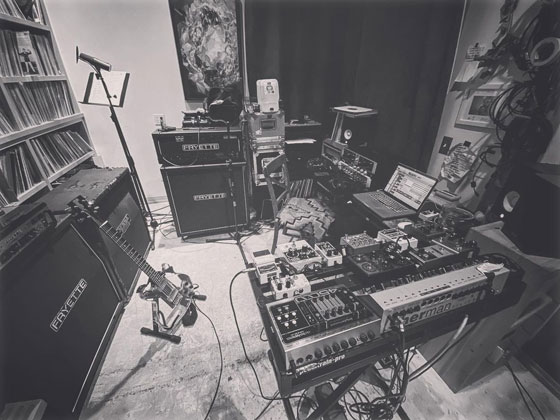
That’s a cool story and some great advice. Thank you. Do you have a practice routine or warm up that you do daily?
It really changes from time to time and this last year has been really difficult in terms of maintaining any regular practice schedules. A lot of my scheduling of musical activity has to do with when I’m supposed to record or tour. So, if I know that we have a rough idea of when we want to record, that’s when I’ll start the process of writing and I’ll spend a good amount of time working out the ideas until I have enough of a semblance of how an album, or track, should be.
Same with touring, when a tour is coming up, I’ll spend a certain number of days leading up to the tour practicing all the parts and getting the muscle memory back. That’s part of the imposed structure of the outside life that helps me stay disciplined in my practice. This last year, I have played very very little guitar and I’m still not sure what to make of it. I’ve had a lot of music come out last year and that is what took up my time. I was doing artwork for those things and then the administrative side of being a musician, but, there’s also a part of me that felt so disheartened about not being able to play shows and not being able to see my bandmates, that it was almost like a weird protest. Like alright, if I can’t do that stuff then I’m not even gonna pick up my instrument and I found other things to focus on.
I’ve been very active with my label that my partner Faith [Coloccia] and I run, and I’ve used this opportunity of not touring to spend more time with my son, which has been really good. I do really miss playing guitar and now that it’s a new year and I’m certain things are changing in a more hopeful direction, I know I need to get back to it. But, I’m also at this point where I’ve been playing guitar for I don’t know 30+ years and I realize it’s ok to take a step back if I need to and it’s not going to go away. Its been a central focus of my life for 3/4 of my existence on this planet. I’m just looking at this as a good period of gestation and when I’m ready to play guitar again in a more focused fashion, I’ll know it and I’ll have a whole well of new things to draw from.
Well, I’m definitely looking forward to all the new stuff coming our way from you! Last question. As discussed earlier, I have two boys and my throat hurts if I have to yell at them once [laughs]. How do you do that for entire shows and tours?
[Laughs], I feel it’s like any other activity, if you do it enough you get used to it and as far as my voice is concerned, I really didn’t know what I could do when ISIS started, which was my first experience as a singer, there was none of those instructional videos on how to be a ‘professional screamer’. I didn’t have a proper technique, so I did what felt right. I would use different muscles, and different ways of breathing, to get sounds that were reasonably OK and that’s been the trajectory for me ever since.
I do have some sort of masochistic motivation in my singing as well. I feel almost the same way I do about playing guitar, about pushing my body to its limits to see what I can do, almost to the point, but not inducing suffering necessarily [laughs]. But, when it’s uncomfortable that’s where I get the most compelling results, where I push myself to that place where I don’t feel comfortable and it’s potentially harmful even, and that’s often where, when I listen back, I find that’s the most compelling to me.
Thanks for shedding a little light on the creative process of all your outstanding projects. I appreciate your time and it’s been a pleasure talking to you.
Mamiffer: Facebook | Bandcamp | Twitter
Old Man Gloom: Facebook | Bandcamp | Twitter | Instagram
SUMAC: Facebook | Bandcamp | Twitter | Instagram
Labels: Sige Records | Profound Lore Records | Thrill Jockey Records
Interviewed by: Josh Schneider

